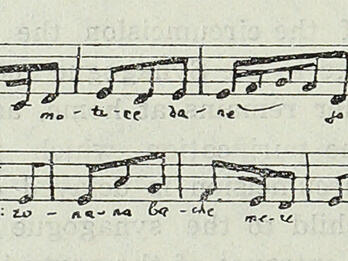Sermon on B’nai Mitzvah Celebrations
A male child becomes obligated to observe the commandments at the age of thirteen years and one day. Therefore, on the first day of his fourteenth year, a father grasps his son in his hand and says, “Blessed be He who has exempted me from the punishment of this one,” and he contemplates the divine name and [the words declaring] God’s kingship in his heart [since these words, contrary to most of the blessings, are excluded from the formula of this blessing]. Then he should make a feast for well-wishers and friends, and invite learned religious scholars. He should make a bountiful and very joyous meal, according to the wealth that God has bestowed on him, for this meal can act as a great advocate for the Jewish people of Israel. Seeing it, the angels who advocate for Israel’s good will say to the Holy One: “Master of the Universe, look how happy your children are in accepting the yoke of your commandments.” This feast is considered a se‘udat mitzvah,1 and the blessing is recited without mentioning the divine name or [the words declaring] God’s kingship. The father says the blessing during the meal, and those present bless the boy that he should merit the study of the Torah, fear of heaven, and fulfillment of the commandments. The prominent guests rest their hands on his head and bless him with the priestly blessing. If the boy is capable of expounding words of Torah, then all the better for him to do so. If not, his father expounds. And if his father does not, then a religious scholar from among the guests expounds. It is good for the boy to wear new clothes and to recite the she-heḥiyanu blessing2 with the intention that the blessing also apply to his accepting the yoke of the commandments. If he is not able [to obtain new clothes] then he blesses on a new fruit. A daughter, too, on the day she enters the obligation of the commandments, though it is not customary to make a feast in her honor, nevertheless should be joyful on that day and wear festive clothes. If she is able, she should wear new clothes and recite the she-heḥiyanu blessing, with the intention that the blessing also applies to her accepting the yoke of the commandments. There are some whose practice is to mark the day of one’s birth every year as a celebration. This is a practice of good effect, and it is also the accepted practice in our home.
Notes
[An obligatory festive meal tied to the observance of a commandment—Trans.]
[“Blessed are you, Lord our God, King of the Universe, who has given us life, sustained us, and brought us to this time.”—Trans.]
Credits
Ben Ish Hai, Sermon on Re'eh: Bat Mitzvah (Baghdad, ca. 1894–98), ch. 17:1. Republished in Sefer tirat ha-kesef–Ben Ish Ḥai, ed. Nuriel Sofer (2016).
Published in: The Posen Library of Jewish Culture and Civilization, vol. 7.



